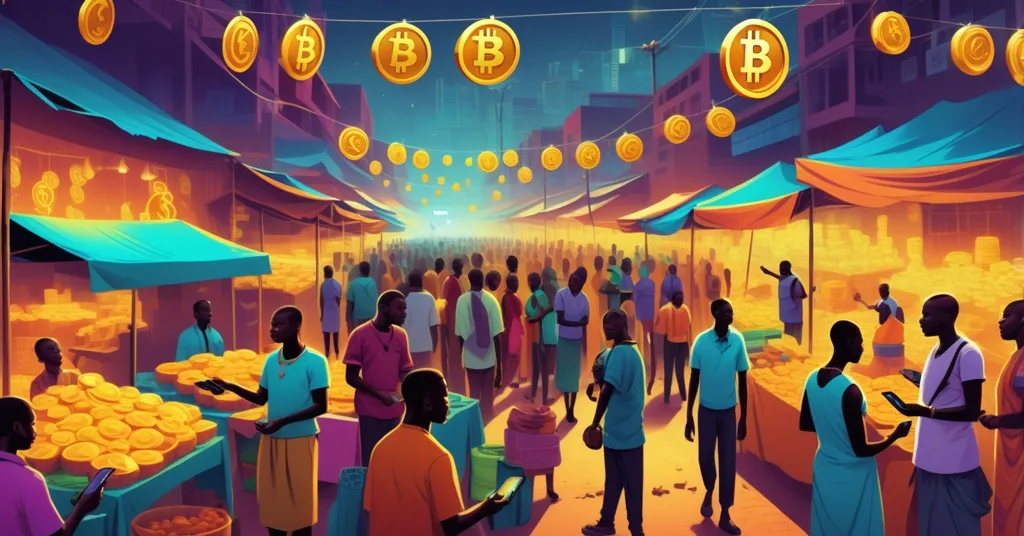African Blockchain Startups Defy VC Slump with $122.5M in 2024 Funding Surge

African Blockchain Startups Crush It in 2024, Defying VC Drought: Report
African blockchain startups have pulled off a stunning feat in 2024, grabbing a hefty slice of venture capital deals on the continent despite a brutal funding slump for startups overall. According to the 2024 Africa Blockchain Report by CV VC and Absa, these innovators are not just hanging on—they’re leading the charge with practical solutions like stablecoins and decentralized finance (DeFi) that tackle real financial struggles across the region.
- Market Standout: Blockchain startups secured 13% of all VC deals in Africa and 7.4% of total funding in 2024, punching above their weight.
- Big Deals: Median deal size reached $2.8 million, twice the industry norm, showing strong investor belief in the sector.
- Practical Focus: Investments are honed in on utility platforms like DeFi and stablecoin services, with Yellow Card as a top player.
Funding Triumph in a Tough Market
Let’s break down the numbers that paint a picture of pure grit. In a year when African startups collectively raised $2.6 billion across 427 deals—a significant drop from prior highs—blockchain ventures snagged 13% of those deals and 7.4% of the cash, equaling $122.5 million. That’s a slight uptick from 7% of funding in 2023, showing growth in a shrinking market. Compared to the global blockchain funding haul of $12.1 billion, Africa’s share is a measly 1% (down from 1.8% last year), but locally, these startups are outshining their peers. The median deal size of $2.8 million is double the broader industry average, though the average deal size took a 44% nosedive to $4.1 million, hinting at some shakiness in the bigger investments. Still, these stats scream one thing: investors are betting on blockchain as Africa’s dark horse in a tight funding race, as highlighted in a recent report on African blockchain startups outperforming the VC landscape in 2024.
Why the confidence? It’s not blind hype. Africa’s financial system has left millions high and dry—over 60% of Sub-Saharan Africa’s population remains unbanked in many areas, and currency devaluations can wipe out savings overnight. Blockchain offers a way to sidestep this mess with decentralized, borderless solutions. Investors see the potential for outsized returns in a region desperate for financial innovation, even if global capital still largely ignores the continent. For deeper insights, check out the detailed analysis in the 2024 Africa Blockchain Report.
Stablecoins and DeFi: Africa’s Financial Rescue
What’s fueling this blockchain boom? Unlike the early crypto craze where speculative projects ruled, 2024 is all about utility—real tools for real problems. We’re seeing a shift towards platforms like DeFi, which stands for decentralized finance, a system that lets people lend, borrow, and earn interest without traditional banks using blockchain tech. Then there’s data infrastructure for transparent record-keeping, and stablecoin services that link fiat money (like dollars or local currencies) to digital assets. Stablecoins are the big story here. These are cryptocurrencies tied to stable assets, often the US dollar, to avoid the wild price swings of something like Bitcoin. They’re a godsend in places where local currencies lose half their value in a year. Learn more about why stablecoins matter so much in Africa.
For the uninitiated, imagine you’re a small business owner in Nigeria. Your naira might tank tomorrow, but with stablecoins, you can store value in a digital dollar equivalent and pay suppliers across borders without insane bank fees. This isn’t theory—it’s survival. Matthias Ruch, CEO of CV VC, dropped a bombshell prediction on this trend:
“It is probable that within a decade, more Africans will use stablecoins for daily transactions than hold traditional bank accounts.”
Leading this charge is Yellow Card, an African crypto exchange that’s become the gold standard for blockchain utility. In October 2024, they secured a massive $33 million in a Series C round led by Blockchain Capital, pushing their total funding to $88 million and making them the continent’s highest-funded exchange. Their strategy isn’t about casual traders swapping coins for kicks; it’s about businesses. Since pivoting from a consumer focus to business-to-business (B2B) services after their $40 million Series B in 2022, Yellow Card now supports 30,000 businesses with payment and treasury tools. Their transaction volumes have skyrocketed from $1.7 billion to over $3 billion. As CEO Chris Maurice put it, it’s not hype driving this—“people need them.” Aleks Larsen from Blockchain Capital agreed, hailing Yellow Card for creating “fast, affordable rails” for financial access through stablecoins. Dive into the details of this milestone with news on Yellow Card’s $33 million funding round.
Grassroots Crypto: Adoption from the Ground Up
Beyond flashy VC deals, blockchain is taking root at the community level in Africa. Peer-to-peer Bitcoin trading thrives in places like Kenya, where remittances from abroad often arrive in BTC to dodge predatory bank fees. In Nigeria, which ranks second globally for crypto adoption, individuals and small vendors use stablecoins to hedge against naira inflation. These grassroots movements aren’t waiting for top-down approval—they’re building parallel economies. Picture a street market trader in Lagos accepting USDT (a popular stablecoin) via a smartphone app because it’s more reliable than cash. This bottom-up adoption proves blockchain’s low barrier to entry is a superpower in regions where traditional finance has failed. For inspiring examples, browse through success stories of African blockchain adoption on Reddit.
But it’s not all rosy. Scalability is a nagging issue. Many stablecoins run on networks like Ethereum, where transaction fees (known as “gas fees”) can hit $5 or more per transfer—crippling for a small trader. Layer-2 solutions or alternative blockchains are emerging to cut costs, but they’re not widespread yet. And energy constraints in power-scarce regions make running blockchain nodes a challenge. Without tech fixes, this grassroots momentum could stall.
Global Disparity and Local Struggles: The Harsh Reality Check
Before we get too giddy, let’s face the ugly truth. African blockchain startups might be killing it locally, but globally, they’re barely a blip. That $122.5 million in funding? It’s just 1% of the blockchain cash splashed worldwide. While Silicon Valley and Shanghai rake in billions, Africa’s innovators are fighting for crumbs. This isn’t just a funding gap; it’s a damn canyon. Regulatory tantrums don’t help—look at Binance’s mess in Nigeria, where government crackdowns over money laundering fears led to detentions and fines, spooking investors and users alike. Some countries outright ban crypto, while others flip-flop on policy, leaving startups in limbo. For a broader understanding of blockchain tech and its challenges, refer to the comprehensive overview on Wikipedia.
Then there’s the graveyard of failed ventures. Companies like Pillow, Paxful, and Mara collapsed under regulatory pressure, mismanagement, or inability to scale. Yellow Card stands out as a survivor, but it’s the exception, not the rule. These failures are a stark reminder that success isn’t guaranteed, no matter how promising the tech. And let’s talk stablecoins—while they’re a lifeline, their reliance on centralized issuers like Tether (with its own transparency issues) and pegs to foreign currencies like the US dollar raises red flags. Are we swapping one master for another, trading bank oppression for digital dollar dependency? Explore more on Yellow Card’s role in this space via its impact on African crypto markets.
Policy Push and Future Horizons: G20 in the Spotlight
Enter the geopolitical stage. November 2024 brings the first-ever G20 Leaders’ Summit to Africa, hosted in Johannesburg. With digital economy priorities like connectivity, AI equity, and digital public infrastructure (think government-backed systems for identity and payments) on the agenda, blockchain advocates are clamoring for airtime. Why shouldn’t they? Blockchain can power digital identities, slash cross-border payment costs, and make supply chains transparent—aligning perfectly with G20 goals for financial inclusion. For more on this event’s focus, see the G20 Summit agenda on digital economy impacts in Africa. Rob Downes, Head of Digital Assets at Absa, sketched a bold vision:
“It certainly isn’t farfetched to see a future world where digital money lives on blockchains, with AI tooling monitoring real-time activity and patterns to detect and prevent fraud, money laundering and terrorist financing, and money transfers happening seamlessly when pre-agreed conditions are met.”
Matthias Ruch of CV VC framed Africa’s blockchain scene as a global wake-up call:
“This is not just an imbalance; it’s an opportunity. An invitation to investors, developers, policymakers and innovators to engage with one of the most promising blockchain frontiers on the planet.”
From a Bitcoin maximalist angle, there’s plenty to like. Stablecoins may run on Ethereum or other chains, but they echo Bitcoin’s ethos of sound, decentralized money. Yet, Bitcoin itself often plays a different role in Africa—more a store of value or remittance tool than a daily transaction medium. Altcoins and stablecoin platforms fill gaps Bitcoin isn’t meant to address, and that’s fine. No single chain should dominate; diversity drives innovation. Still, the G20 could be a game-changer if it pushes cross-border blockchain standards or funding commitments. Without policy clarity, though, even the best startups risk being crushed by inconsistent rules across African nations.
Balancing Hype with Hard Truths
As champions of decentralization and effective accelerationism—pushing for fast, disruptive tech adoption—we’re thrilled by Africa’s blockchain surge. Low barriers to entry let decentralized systems leapfrog a broken financial status quo, empowering millions where banks have failed. But let’s keep our heads screwed on straight. Without serious global investment, technical solutions to scalability woes, and saner policies, this spark could fizzle. Africa’s blockchain story in 2024 is one of raw determination—an underdog swinging hard against the odds. Whether the world steps up to back this fight remains the billion-dollar question. For a deeper look at potential solutions, read about DeFi’s role in serving the unbanked in Africa.
Key Takeaways and Questions on African Blockchain Surge
- How big is blockchain funding in Africa currently?
African blockchain startups nabbed 13% of VC deals and 7.4% of funding in 2024, totaling $122.5 million, with median deal sizes at $2.8 million—double the industry average—reflecting strong local investor faith. - What’s steering blockchain investments in Africa?
The trend leans towards utility platforms like DeFi and stablecoin services, solving urgent needs like financial access and currency stability rather than speculative tech. - Why are stablecoins a game-changer in Africa?
With vast unbanked populations and volatile currencies, stablecoins provide a steady alternative for transactions and savings, potentially outpacing traditional bank accounts in a decade. - Could the G20 Summit in Johannesburg boost African blockchain?
As the first G20 Summit in Africa, it’s a chance to embed blockchain in global economic talks, possibly accelerating policy support and investment if prioritized with digital infrastructure. - What challenges persist for African blockchain startups?
They capture just 1% of global blockchain funding, face erratic regulations across nations, and struggle with scalability issues like high transaction fees and energy shortages. - How does grassroots crypto use shape Africa’s future?
Peer-to-peer trading and small-scale adoption of Bitcoin and stablecoins build parallel economies, proving blockchain’s power to bypass failed systems, though scalability remains a hurdle. - What risks come with stablecoin reliance in Africa?
Dependence on centralized issuers and USD pegs could undermine true financial sovereignty, swapping one form of control for another if not paired with decentralized alternatives like Bitcoin.



